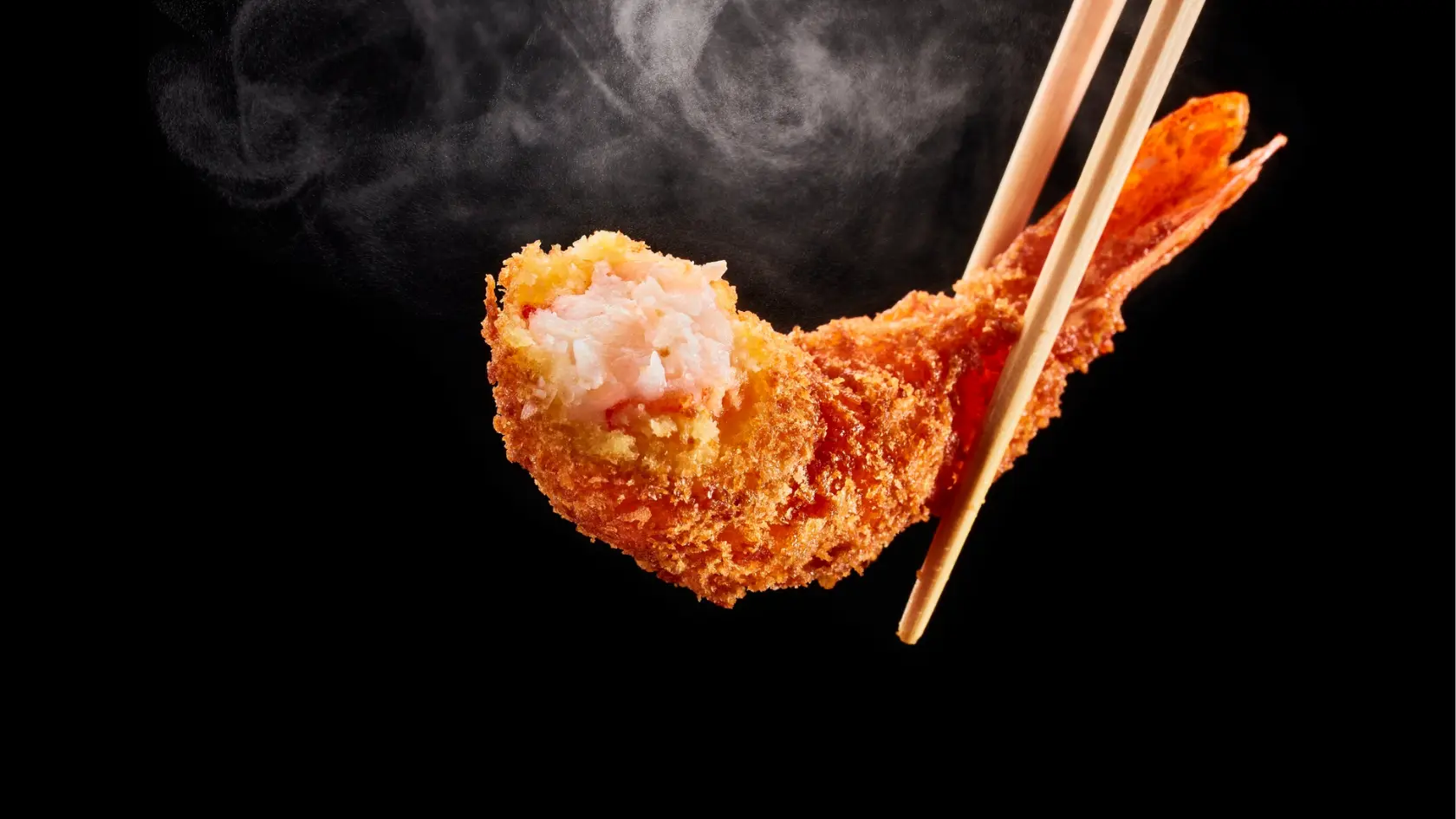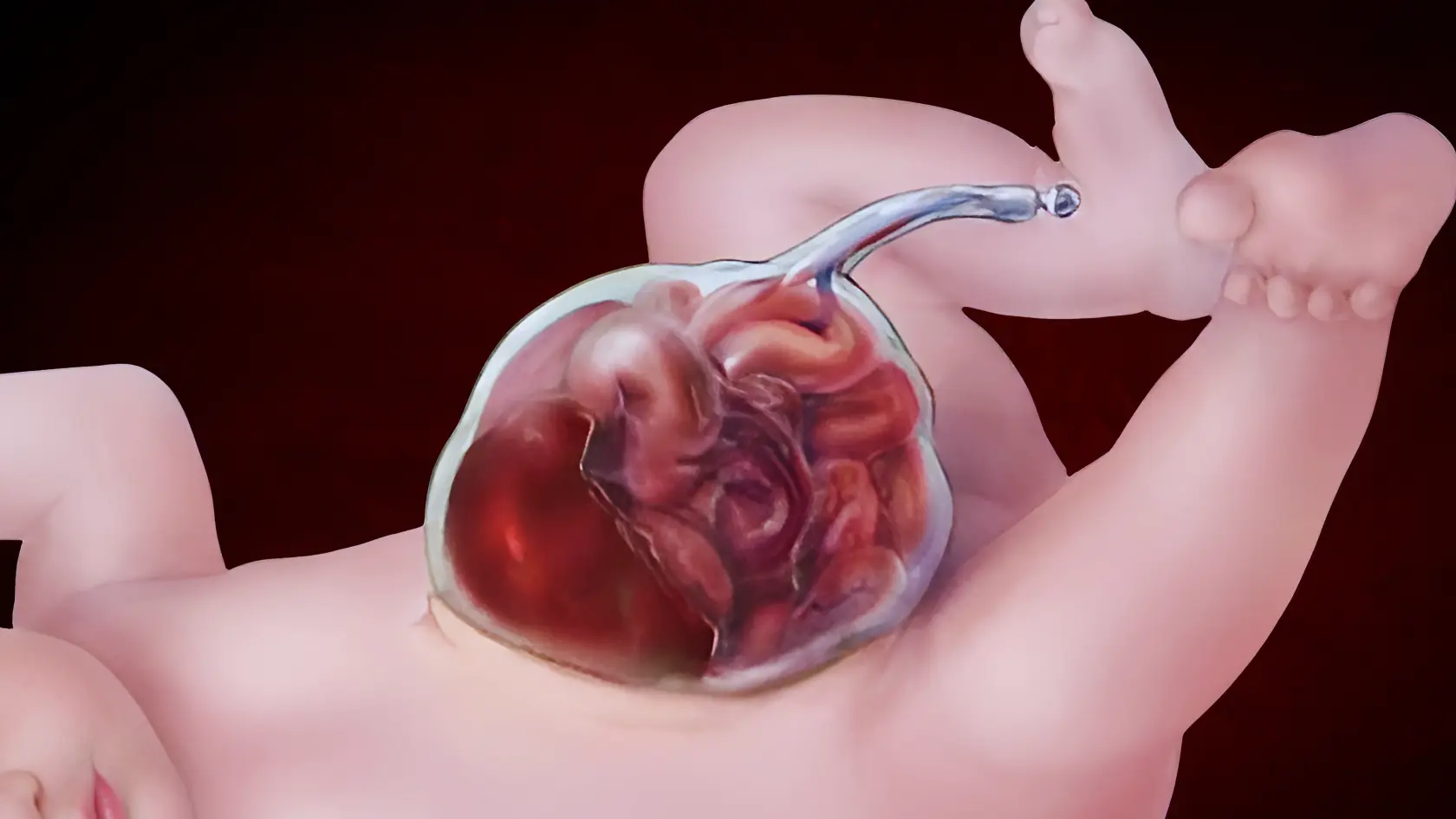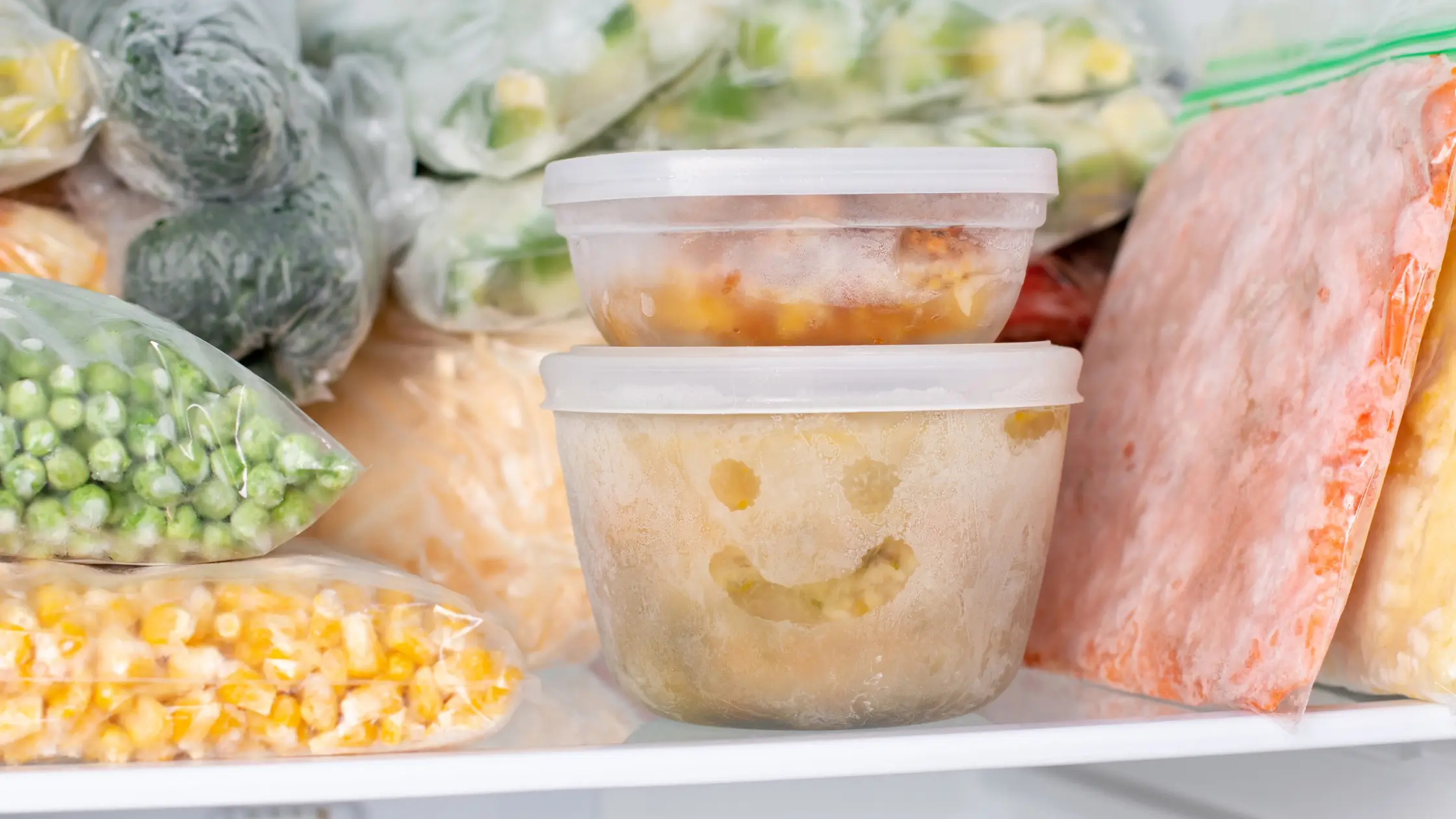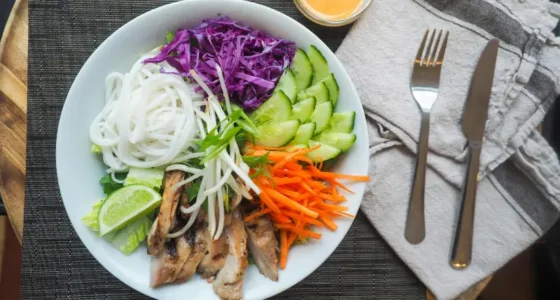Can pregnant women eat shrimp? Many pregnant women wonder about this because seafood can be a healthy part of a balanced diet. Shrimp is high in protein, omega-3 fatty acids, and other important nutrients, but you should be careful about how much you eat while pregnant. This comprehensive guide will cover the safety of eating shrimp during pregnancy, its benefits, potential risks, and how to include shrimp in your diet safely.
Table of Contents
- Is Shrimp Safe to Eat During Pregnancy?
- Nutritional Benefits of Shrimp for Pregnant Women
- Risks of Eating Shrimp While Pregnant
- Can You Eat Shrimp While Pregnant? Guidelines for Safe Consumption
- How Much Shrimp Can You Eat While Pregnant?
- Shrimp and the Mediterranean Diet for Pregnancy
- Preparing Shrimp for Pregnancy: Safe Cooking Methods
- Frequently Asked Questions
- Conclusion: Can Pregnant Women Eat Shrimp?
Is Shrimp Safe to Eat During Pregnancy?
Pregnant women often need to pay extra attention to their diet to ensure both their health and their baby’s development. Seafood, in general, provides excellent nutrients like protein, iron, and omega-3 fatty acids, all of which are beneficial during pregnancy. Can pregnant women eat shrimp? Yes, shrimp is typically safe to consume when properly cooked and eaten in moderation. However, there are some important considerations that should be kept in mind.
Nutritional Benefits of Shrimp for Pregnant Women
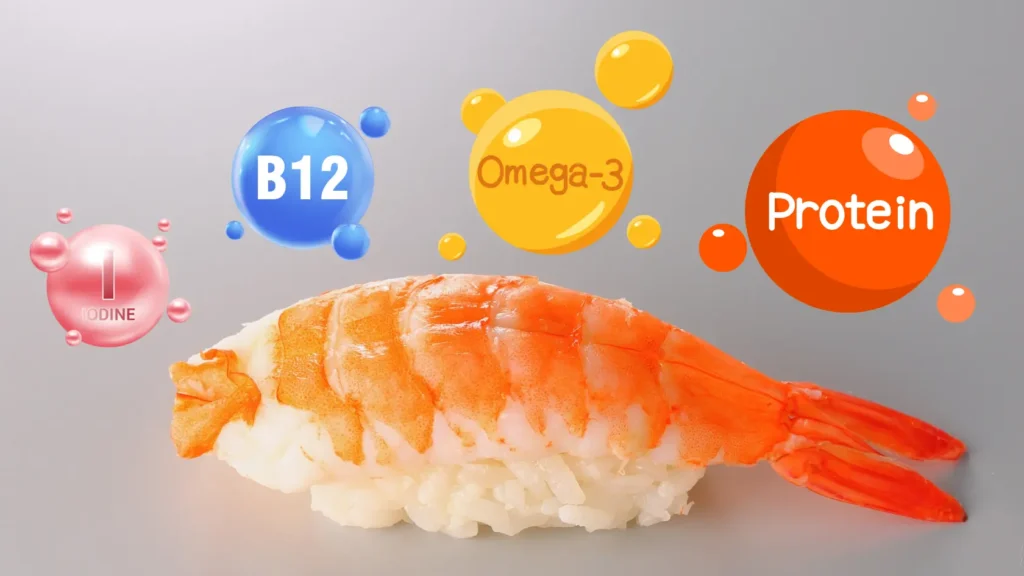
Shrimp is a great food for pregnant women because it is low in fat and calories and high in protein. It gives you important nutrients like:
- Protein: Very important for the growth of the fetus and the development of tissues. It helps the baby grow and develop properly by making important organs. Protein is an important nutrient for both the baby’s physical development and the mother’s health during pregnancy. It helps build muscle tissue and the immune system.
- Omega-3 fatty acids: These help the baby’s brain and eyes grow. They play a significant role in the formation of neural connections and improve cognitive functions, which are essential for brain development. Omega-3s also help to reduce inflammation and may promote a healthy pregnancy, benefiting both the mother’s and baby’s heart health and immune system.
- Vitamin B12: Important for the formation of red blood cells. It aids in the production of DNA, supports the nervous system, and prevents anemia, ensuring that both mother and baby have optimal energy levels. Additionally, vitamin B12 plays a role in preventing birth defects and maintaining a healthy metabolism, which is crucial for both maternal health and fetal growth.
- Iodine: Necessary for the thyroid to work. It helps make thyroid hormones, which control metabolism and are very important for brain development and the baby’s growth during pregnancy. Iodine also helps prevent cognitive impairments and developmental delays, ensuring that the baby’s nervous system develops properly and that the mother’s energy levels remain balanced throughout the pregnancy.
Including shrimp in your pregnancy diet can provide these nutrients, which support both maternal and fetal health.
Risks of Eating Shrimp While Pregnant
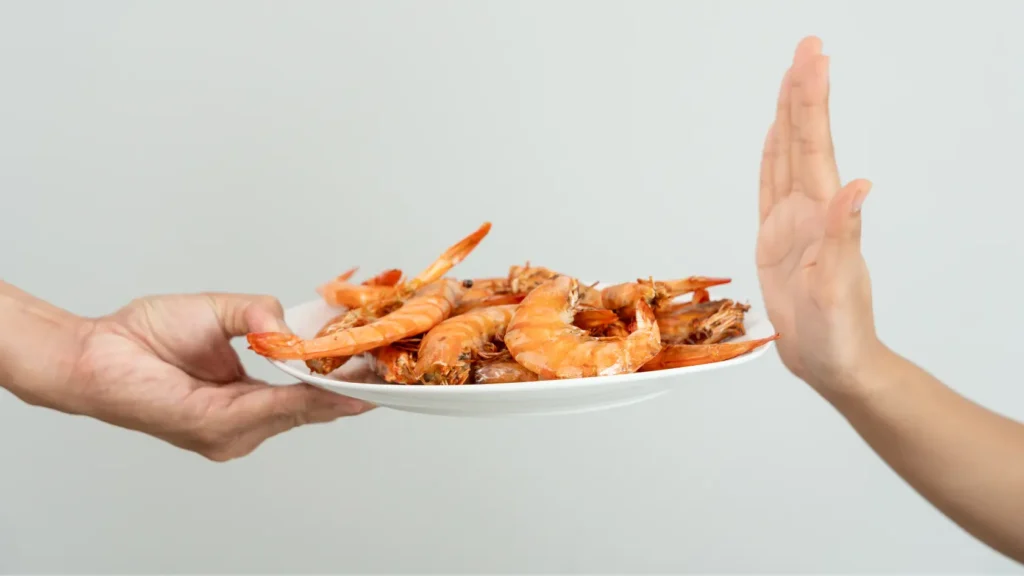
Shrimp can be a healthy food, but pregnant women should be aware of some possible dangers:
- Mercury Levels: Some kinds of seafood, especially big fish, have a lot of mercury in them, which can be bad for a growing baby. Exposure to mercury can cause problems with the nervous system, cognitive impairments, and learning disabilities, which could affect your baby’s growth and development. Shrimp has less mercury than other types of seafood, so it is safer for pregnant women to eat, especially if they don’t eat too much of it. This makes shrimp a viable choice for those looking to include seafood in their diet while minimizing mercury-related risks.
- Foodborne Illness: Raw or undercooked seafood can carry bacteria, parasites, and viruses that pose a risk to both the mother and baby. These illnesses can lead to serious complications such as food poisoning, dehydration, preterm labor, or even miscarriage in severe cases, putting both your health and your baby’s safety at risk. To minimize this risk, make sure shrimp is cooked thoroughly to an internal temperature of 145°F (63°C), ensuring it is safe to consume and reducing the chances of any harmful bacteria or pathogens. Properly cooked shrimp is essential for preventing illness and promoting a healthy pregnancy.
- Shellfish Allergies: Some people may be allergic to shellfish, and this risk is heightened during pregnancy. During pregnancy, the immune system changes, which can cause an allergy for the first time or make an existing one worse. Hives, swelling, or trouble breathing are all signs of an allergic reaction, and they can be very dangerous for both the mother and the baby. If you have never had a shellfish allergy before but notice any strange symptoms, like trouble breathing or swelling, you should see your doctor right away to make sure you are safe and avoid any serious problems.
Can You Eat Shrimp While Pregnant? Guidelines for Safe Consumption
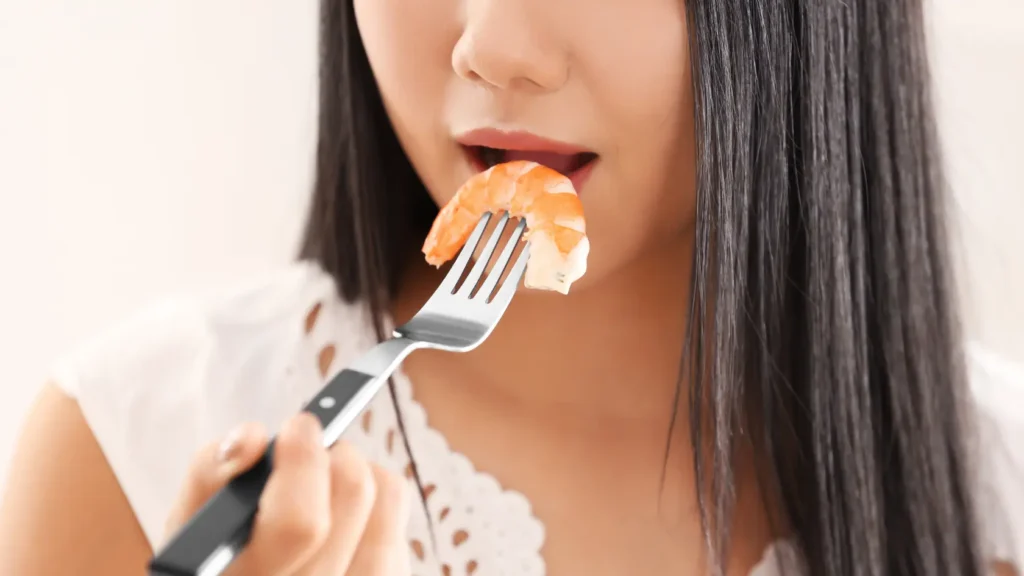
To enjoy shrimp safely during pregnancy, follow these guidelines:
- Choose Cooked Shrimp: Always choose shrimp that has been cooked all the way through. Don’t eat raw shrimp, like the kind used in sushi or some salads, because they may have bacteria, parasites, or viruses that are bad for both the mother and the baby. Raw shrimp may also have toxins that can make you sick, like listeria or salmonella. Cooking the shrimp properly gets rid of these risks, making it safe to eat while pregnant and keeping its nutrients.
- Limit Consumption: Moderation is very important. Shrimp doesn’t have a lot of mercury, but it’s still best to eat it in moderation to keep your diet balanced. Eating too much of any food, even shrimp, which is good for you, can throw off your nutrient balance and cause problems during pregnancy, such as digestive issues, food sensitivities, or other problems. Eating a wide range of foods will help you get all the nutrients you need without getting too much of any one type.
- Check for Freshness: Only purchase shrimp from a reputable source. If you buy fresh shrimp, ensure it is stored properly and used within a day or two to avoid spoilage. Fresh shrimp should feel firm, smell clean, and not have any spots or other discoloration. To keep the quality, make sure it stays at a safe temperature when frozen. Always check the shrimp for freezer burn, strange smells, or a slimy texture, as these could mean that they have gone bad.
- Avoid Shrimp in Certain Dishes: Some dishes, like shrimp cocktails or shrimp that hasn’t been refrigerated properly, might increase the risk of foodborne illness.When left out at room temperature for a long time, these kinds of dishes may let bacteria grow quickly. Stick to shrimp dishes that are fully cooked to lower the risk of contamination and make sure they are safe to eat, especially when you’re pregnant and your immune system is weaker.
How Much Shrimp Can You Eat While Pregnant?
There isn’t a strict limit on how much shrimp you can eat while pregnant, but most guidelines say that pregnant women should eat up to 12 ounces of seafood a week. This includes a range of fish and shellfish, and shrimp can be part of this weekly diet. The most important thing is to eat seafood that doesn’t have a lot of mercury or other harmful chemicals in it. Shrimp is a safe choice when eaten in moderation because it has low levels of mercury and is a good source of protein and omega-3 fatty acids.
Shrimp and the Mediterranean Diet for Pregnancy
The Mediterranean diet is often recommended for pregnant women because it emphasizes fish, healthy fats, and fresh vegetables. Shrimp is a great fit for this diet and can be a tasty, healthy substitute for other types of protein. Eating seafood for its omega-3 fatty acids and vegetables for their antioxidants can help keep you healthy and happy during pregnancy. Shrimp is a great addition to Mediterranean-style dishes like shrimp pasta with olive oil, garlic, and tomatoes, or grilled shrimp with roasted vegetables on the side.
Preparing Shrimp for Pregnancy: Safe Cooking Methods
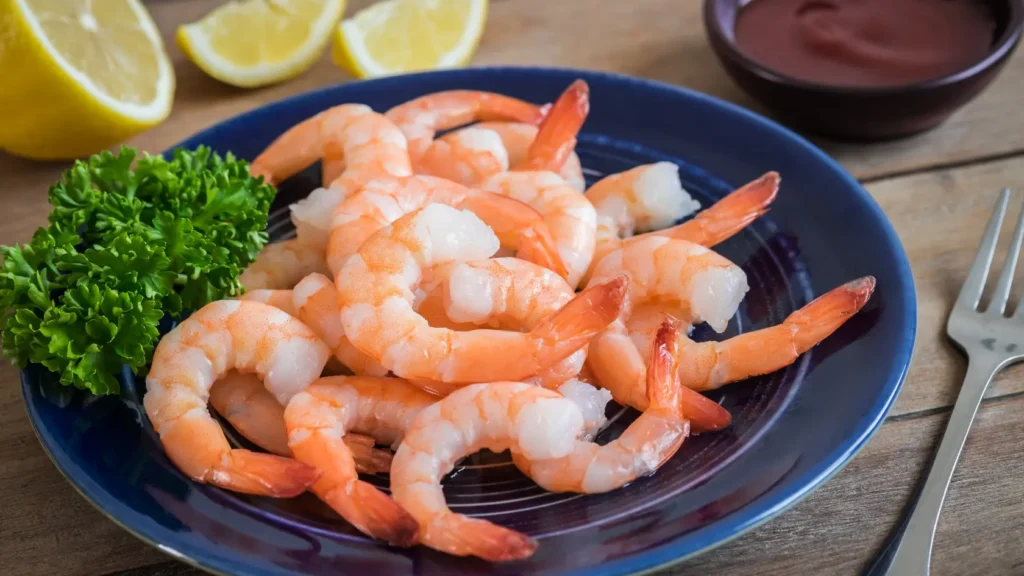
The method you choose to cook shrimp can impact its safety during pregnancy. Here are some simple and safe ways to prepare shrimp:
- Boiling: A common and easy way to cook shrimp, boiling helps retain the shrimp’s natural flavor without adding unnecessary fat. It’s also a quick cooking method, which helps preserve the shrimp’s nutrients while keeping the texture tender. When you boil shrimp, it cooks evenly without drying out. Adding salt, garlic, or herbs to the water will give it more flavor without taking away from its nutritional value. This method keeps the shrimp juicy and keeps its natural sweetness.
- Grilling: Grilling shrimp can impart a smoky flavor and is a healthy way to prepare the seafood without excess oil or butter. The high heat from grilling also helps the shrimp caramelize, which makes it sweeter and gives it a nice crispy outside. You can add flavor to shrimp by marinating it in citrus, garlic, or herbs before grilling it. This makes it a tasty and healthy choice that goes well with salads, rice, or roasted vegetables.
- Sautéing: Lightly sauté shrimp in olive oil, garlic, and herbs for a flavorful dish. Shrimp cooks quickly, so don’t overcook it or it will get tough. Sautéing the shrimp in olive oil lets them soak up the flavors of the garlic and herbs, making a tasty dish that goes well with many kinds of vegetables, pasta, or grains. This method is also quick and easy, so it’s a good choice for busy days when you still want a healthy, filling meal.
Avoid methods like deep frying, as these can add unnecessary calories and unhealthy fats.
Frequently Asked Questions
1. Can I Eat Shrimp While Pregnant if I Have a Shellfish Allergy?
If you have a shellfish allergy, you should avoid eating shrimp during pregnancy. Eating shrimp or other shellfish can cause an allergic reaction, which can be harmful to both you and your baby.
2. Is It Safe to Eat Shrimp in Sushi During Pregnancy?
No, it’s not safe for pregnant women to eat sushi with raw shrimp. Raw seafood can have bacteria or parasites in it that can make you sick. Always ensure that shrimp is thoroughly cooked.
3. How Do I Know if Shrimp Is Cooked Properly?
Shrimp is properly cooked when it turns pink and opaque. Its flesh should be firm to the touch, and the internal temperature should reach 145°F (63°C). If you’re unsure, use a food thermometer to be safe.
4. What Seafood Can I Eat During Pregnancy?
Shrimp is safe to eat, but salmon, trout, and sardines are other seafood that doesn’t have a lot of mercury in it. Don’t eat fish with a lot of mercury, like swordfish, shark, or tilefish. Always ask your doctor for advice that is specific to you.
5. Can I Eat Shrimp While Pregnant Every Day?
Shrimp can be a healthy part of a pregnancy diet, but it’s important to eat a wide range of foods to get all the nutrients you need. Eating shrimp every day might make your diet unbalanced, so it’s best to get protein from other foods as well.
Conclusion: Can Pregnant Women Eat Shrimp?
In conclusion, can pregnant women eat shrimp? Yes, shrimp is usually safe and good for you to eat while pregnant as long as it is cooked properly and eaten in moderation. It has important nutrients like protein, omega-3 fatty acids, and iodine that are good for both the mother and the baby. Pregnant women can eat shrimp as part of a healthy and balanced diet if they follow the safety rules, don’t eat raw or undercooked shrimp, and choose a variety of seafood. Always talk to your doctor about how much seafood you should eat while pregnant.
Explore more on Pregnancy Must –
